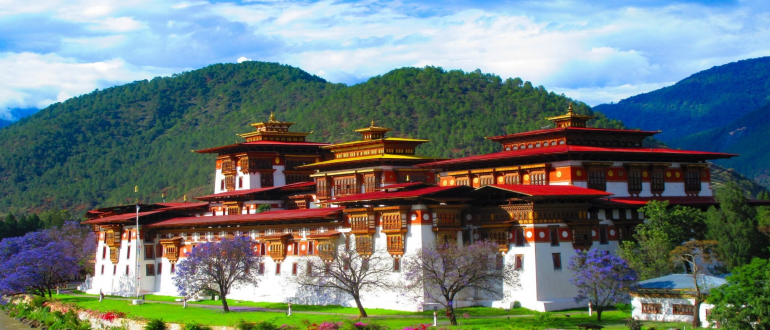
Is this where happiness lives? On the concept of Gross National Happiness
In recent years, the idea of including happiness as a variable in political decision making is becoming increasingly popular and has found its way into politics in several nations around the world. Happiness and well-being as key aspects of governance were first elaborated in the Gross National Happiness (GNH) concept of the Kingdom of Bhutan – a small South Asian nation situated at the foothills of the Himalayas between the People’s Republic of China and India.
In an initial step, Bhutan developed GNH as a state philosophy that criticizes the narrow framing of development based on economic growth. GNH was supposed to illustrate what an alternative to likely over-consumption, social inequality, and resource depletion could look like. GNH is supposed to serve as a lens for guiding national development that makes sustainability, well-being, and happiness its key priorities. It does so through the GNH index that – in a second step – developed GNH from a philosophy to a tool for policy making. The index is based on surveys relying on the operationalization of well-being and happiness to make them measurable variables. GNH became a key component of Bhutanese politics when then King Jigme Singye Wangchuck declared that GNH was more important than gross domestic product (GDP) in 1972. It remains debatable whether GNH actually leads to the desired impact.
GNH is an important component of policy and decision making in Bhutan and is now
codified as a central political principle in article 9 of the new constitution
from 2008. It distinguishes four policy areas: (I) sustainable and equitable
socioeconomic development, (II) preservation of the environment, (III)
preservation and promotion of culture, and (IV) promotion of good governance.
These four fields are central aspects of the surveys for the GNH index, which
are created by the Center for Bhutan Studies and GNH Research. The surveys were
first carried out in 2008 and have since then been conducted nationwide among
8,000 randomly selected households every five years. The GNH Index is divided
into nine core areas: questions on health, education, and living standards are
complemented with questions on time use, public administration and governance,
environmental and cultural diversity and resilience, and psychological
well-being and societal vitality. These areas each include two to four
indicators – a total of 33 indicators are incorporated into the GNH index. This
process is intended to provide an evaluation of the acceptance of government
policies over time and to assess current societal problems, which is hoped to
result in greater
policy coherence.
The Bhutanese government has taken a number of measures in recognition of Gross National Happiness. According to environmental protection laws of the constitution, at least 60% of the territory must be permanently forested – currently, the share is about 70%. Deforestation is only allowed if new trees are planted correspondingly. Slash and burn is punishable by law. Unprocessed wood from trees logged in Bhutan must not be exported. Industry businesses are subject to mandatory environmental impact assessments. Furthermore, all of Bhutan’s energy consumption comes from renewable sources generated by hydroelectric and solar power plants – the surplus of which is exported, now being the country’s largest export, accounting for more than one-third of all public revenues. This makes Bhutan the only country in the world whose largest export is energy from renewable sources. Overall, Bhutan can rightfully be considered to be one of the most environmentally friendly countries on earth – it is not only carbon neutral, but carbon negative, meaning it absorbs more carbon than it emits. Bhutan also stands out in questions of social issues. Although access to schools and medical facilities remains difficult in remote areas of Bhutan, education and medical care are free of charge, The average age of the population is approximately 29 years while life expectancy amounts to about 72 years, due to a high birth rate and rapid improvements in medical care and a consequent rise of life expectancy over the past two decades. The illiteracy rate in Bhutan amounts to about 36%, while it is in the low single digits for youths. The corruption rate remains very low. Bhutan ranks 23rd on the Corruption Perception Index, just below nations such as France (22nd), surpasses countries such as the United States (24th), and shows a steady upward trend.
Despite such initiatives and substantial achievements, Bhutan ranked only 97th in the UN’s World Happiness Report, although the index was created on the initiative of Bhutan at the 2012 meeting on „Wellbeing and Happiness: Defining a New Economic Paradigm“. The 2015 GNH surveys found that only 8% were “deeply happy” and 35% were “extensively happy.” 47.9% registered as “narrowly happy”. Existing social problems are diverse. The GNH significantly restricts economic development, for instance, the accession to the World Trade Organization was rejected by the Bhutanese government in 2017, referencing GNH. Bhutan remains one of the least developed countries in the world – most of the population is engaged in subsistence farming. Poverty is particularly prevalent in remote areas of the country that are poorly arable. Youth unemployment amounted to around 10% in 2019. Also, increasing income inequality is emerging as the economy grows. Moreover, coercion of cultural assimilation in minority communities persist. Most notably, Bhutanese people of Nepali descent were victims of assimilation measures, exclusion in citizenship laws and of forced repatriations to Nepal in the late 1980s.
The concept of Gross National Happiness understands general well-being of the population as the central priority of policy making. In light of GNH, the Kingdom of Bhutan has introduced a variety of policies that have been critical in protecting the environment, shaping social development in issues such as education and health, and building a sustainable economy. Although there are significant limitations to the successful implementation of aspects of GNH into policy in Bhutan, GNH nonetheless provides valuable approaches for more sustainable and coherent policy making.
This article was published in the January issue of the “Diplomatisches Magazin”, 2022. Find it here.

Nikita Goch
Nikita Goch studies political science, law, and Chinese studies at the University of Munich. His focus lies in international relations, politics in Asia, and security policy. Nikita speaks Chinese, Vietnamese and is studying Korean. He is the co-director for Asia-Pacific at CISS.
